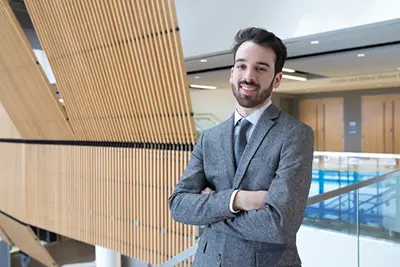Experience and Classroom Discussion Open Opportunities and Lead to Jobs
 Image by Courtesy
Image by Courtesy
08/15/2019
By Katharine Webster
Criminal justice major Mary Chiccarelli always wanted to help people. And she thought she wanted to do it by being a police officer.
So she interned at the Tewksbury Police Department last summer. It was a great experience, in part because it helped her realize that she wants to see people through to the end of the criminal justice process – and, she hopes, help them to build a better life.
This summer, Chiccarelli interned for credit in the probation department at Ayer District Court for 60 hours. She loved it, and now she’s registered to take the probation entry exam in October. She hopes to find a job by the time she graduates in December.
“I liked seeing what the justice system is doing after these people commit a crime and are detained,” she says. “Probation gives people who’ve made a mistake another chance at life. I get to make a really big impact working in probation.”
Chiccarelli was one of several students who took adjunct faculty member Ron Corbett’s criminal justice internship course this summer. He also teaches it both semesters during the school year, with up to 20 students in each class.
 Image by K. Webster
Image by K. Webster
The former executive director of the state Supreme Judicial Court and acting commissioner of probation for Massachusetts, Corbett can guide students to good internships in whatever field they’re considering: policing, corrections, homeland security, the courts or victim services. Other students find their own internships, or get internships through recommendations from other faculty.
Corbett says the internships yield dividends for students by connecting their classroom learning to the real world of work. They also give students experience they can put on a resume, professional contacts in their field and a chance to solidify – or change – their career plans.
“An internship is a reality test,” he says. “It gives students a sense of what day-to-day life is really like in a particular job. Frequently, students will say, ‘I’m confirmed in my interest,’ but other times they’ll say, ‘I’m glad I did this, because I realize that it’s not for me.’”
For senior Jessica Baudanza, an internship at the Middlesex Jail and House of Correction in Billerica firmed up her interest in working in corrections and helped her narrow it down to a specialty that will combine both of her majors: criminal justice and psychology.
“Before, I wasn’t sure what I wanted to do, but now I know I want to be a case manager/counselor within the prison system,” she says. “This internship was a great place to start. I learned what the expectations would be and if I was really going to be able to carry them out.”
 Image by K. Webster
Image by K. Webster
Baudanza and Chiccarelli both say they gained insight into other possible careers within criminal justice, too, through the shared class experience. Corbett requires each student to keep a journal and talk in class about what they learned and any issues that came up in their work that week. They also discuss assigned readings.
“I’m in the court system, someone else is in the police system, someone else is in corrections, so we have the full circle of the justice system at that table,” Chiccarelli says. “Professor Corbett brought more to the table to think about the profession as a whole. He had us read a book on three aspects: ethics, professionalism and confidentiality.”
Recent alumnus Matthew Chigas ’17, ’19 says internships are invaluable in sorting out career paths. As an undergraduate criminal justice major with a minor in Arabic studies, he interned with the U.S. Embassy in Abu Dhabi and then the Nashua, N.H., Office of Emergency Management.
The second internship led to a job. After Chigas got his bachelor’s degree in December 2017, he began working half time at the agency while going on to earn his master’s degree in international security through the bachelor’s-to-master’s program. Chigas now works full time for Nashua as the emergency management coordinator.
“All of my internships have helped me figure out what I want to do and helped me get jobs – and helped me with fantastic networking opportunities as well,” he says. “I cannot say enough good things about my internships.”




